Robbie Castellano from IMC Australia shares practical tips on how to grow your martial arts school.
IN THIS EPISODE, YOU WILL LEARN:
- How creating a 5-year plan grew Robbie Castellano’s school from 135 to 500 students
- How local and international martial arts tournaments improve their student retention
- The ultimate test for turning over your school
- The importance of having an effective leadership program
- How finding a strategic school location completes half of your marketing
- And more
*Need help growing your martial arts school? Learn More Here.
TRANSCRIPTION
GEORGE: G'day, this is George Fourie and welcome to another Martial Arts Media business podcast. I have today with me Robbie Castellano who is actually a returning guest. We won't get into the details why. He'll probably be a returning guest again, but this is the first actual official podcast we're doing together. So, welcome to the show Robbie.
ROBBIE: Thanks George. Glad to be here.
GEORGE: Awesome. So, just a bit of introduction. So, Robbie's based in Sydney. They run IMC Australia. And also looking at the website now, I'm seeing number one rated martial arts center in Australia as rated by ISKA. So, yeah, we're going to have a bit of a chat and hear what Robbie's up to. So, welcome to the show Robbie.
ROBBIE: Thank you George.
GEORGE: Cool. So, just give us a couple of minutes intro, just your background, what you've got going on, etc.

ROBBIE: Yeah. So, basically started as a kid. Went to a local karate school which is in Western Sydney. Started at the age of four, five. Trained up until I was a teenager and then started working part time for my instructor, teaching. Always loved teaching. So, it was always good to teach the kids and then eventually teaching adults. And then got to my twenties and decided I wanted to go and see the world, so I went traveling around the world for about seven years and I still came back home every now and then to teach a little bit, travel again before eventually settling and managing the school for my instructor and then eventually buying it out 100%.
GEORGE: Excellent. So, in the travels, were you actually instructing as well?
ROBBIE: Na, not really. I was always training, like I was in Thailand and Belarus and England and Colombia. I eventually stayed in Colombia for a few years where I eventually met my wife, but it was always just training, it's hard to teach in a different language.
GEORGE: Got you. I've always wondered if that's an opportunity for young kids if they are learning martial arts and they can instruct if there's an opportunity for them to actually travel abroad and just plug into different schools and instruct for a while.
ROBBIE: Yeah. I'm sure there would be, but I didn't do it, no.
GEORGE: Okay. So, from teaching to owning the school, how did that journey evolve?
ROBBIE: Yeah. So, basically I was in Thailand to do a bit of training with my wife and my instructor had a … he gave me a call saying that he's had a few problems with his current manager and basically asked me if I want to take the reins and manage the school for him. So, I did. I got on the first plane back and started managing the school. We sat down and had a chat, worked out a five year plan. So, I would manage it for five years and then eventually buying it out which I now own. Yeah. So, when we took over, it was up to about 135 students when I managed it and we built it up to about 500 mark now. So, it's going well.
GEORGE: Got you. So, how do you feel that helped, as in having that five year plan and having a good structure and sort of knowing, alright, this is where you're going and I guess, maybe easier to make the purchase as well, sort of.
ROBBIE: That's it. I'm pretty fortunate that I had an instructor, Paul Zadro, as a good mentor. He already did all the hard work of going to the conferences overseas and learning the dos and don'ts. So, we basically sat down and it was like an apprenticeship. The five year plan was to learn the ropes, how to run the floor, run the business side and yeah, to help me eventually to buy it out. So, without that five year plan, I probably wouldn't have been able to do it. So, we've designed that now in our whole IMC organization for the rest of the generation to come through and do the same thing.
GEORGE: Okay, fantastic. So, how does that look then? So, you've got the sort of five year structure where you know how to groom and educate and train people to take over location. How does that look? Do you … are you looking for that within instructors who can take that role or are you looking at that as more sort of an expansion type …
ROBBIE: Yeah. Look, a bit of both. We've got our leadership program and those youngsters that want to come through to eventually open up their own school, we tell them, this is what you have to do. They've got to go through all the reins of being an instructor and then floor manager, program director and then a school manager and then and then the system is to buy out, if they want. We pay our managers fairly highly. So, if they’re happy to just keep their wage and that's fine. If they want to go bigger and more responsibility, we've got a plan to buy it out as well, for them to buy it out.
GEORGE: Got you. How many instructors have taken up that role, taken that path?
ROBBIE: Yeah. At the moment, myself has done it. We've got another instructor Mitchel who runs the IMC Wetherill park school. He's doing it at the moment. He's on the five year journey. We're about to open up another school in the West of Sydney, a young girl and she's going to start the five year journey as well.
GEORGE: On the five year mark, so, does that take 100% ownership or do you still sort of run under a type of franchise model or?
ROBBIE: Yeah. Look, the deal that I had was, I'll take over 100%. Okay? That was always the plan. My instructor always wanted that for me. I've been with him since I was a kid. So, he helped me out. I would want the same for my juniors that have been with me forever too. So, yeah, I was to buy it out 100%. It was still under the IMC organization, but our schools are separately owned.
GEORGE: Got you. Okay. So, when it comes to … so, you have … you mentioned how many locations again?
ROBBIE: We now have four.
GEORGE: Four locations, all Sydney based?
ROBBIE: All Sydney based, yep.
GEORGE: All Sydney based. Okay. So, when it comes to things like marketing and the bigger picture, how do you guys go about that? Is that a team effort or do you still operate individually?
ROBBIE: Yeah definitely. Look, we're big on our organization with team effort. Be individually owned but we all work together. So, every Monday we'll come in, do a team meeting and we all throw out all our different ideas, marketing strategies, statistics, everything, and I think it's … it works in our favor because we've got a lot more heads together, create different ideas and to grow our schools all together. We swap and change instructors sometimes too. I'll send one of my junior instructors over to a different school for a week so they can pick up some new stuff and vice versa.
GEORGE: Yeah, that's super powerful. So, you almost have this whole mastermind group within your own organization and everybody can come from different angles and different perspectives.
ROBBIE: That's right. 100%. Yep. 100%.
GEORGE: So, how do you then take those … let's say, if we had to walk through it, you guys have your Monday meeting, somebody comes up with an idea, then what sort of a process of rolling it out within the schools? Would you trial something first at one school or would you just roll it out and run with it and access the results after?

ROBBIE: Yep. Look, every Monday we'll come through statistics, that's usually the first thing on the agenda, where we've lost, where we've gained and then we'll do our marketing for the month, what we're doing and then we always close the meeting with an idea. If someone's got an idea, we'll get that person to try it in their school, see how it goes and if it's successful, then we'll try it in the other schools. If it fails, then the other schools don't do it obviously.
GEORGE: Got you. So, can you say a bit more just about sort of that structure of that Monday meeting? So, you mentioned you've got statistics, you talk marketing, etc, is there anything else that you cover within moving the organization forward?
ROBBIE: So, we always talk about what we're doing that month. So, whether it's a life skill project or something like that, gradings or if we're doing seminars, how to organize that. But pretty basic standard meeting. Nothing too drastic. But it works. Everyone turns up and everyone is on the same page. That's important. If one ball drops, then the rest will crumble in the end. So, it's important to keep it all together.
GEORGE: Got you. Okay. So, let's talk a bit more about … so, you're based in Liverpool right?
ROBBIE: Yes. Western Sydney. Yep.
GEORGE: Western Sydney, got you. I believe that now that we're talking about it, Paul Zadro, I did see him on the news taking on the political role. Is that right?
ROBBIE: Yeah. I think he's got to that stage in his life where he needs another challenge. He's a very successful man, so I think he wanted that next challenge. So, he worked for the local Liverpool seat. Unfortunately he didn't win, but I'm sure he had a good experience. He made a lot of contacts as well. It was actually good for us to watch it so it all works.
GEORGE: Got you. Actually, I did another podcast interview yesterday with Jim Morrison in Canada and he was mentioning their 15th birthday this year and the mayor’s coming along. I was like, hang on, you can't let that story just rest. How do you get the mayor to attend your birthday?
He said, no, okay, they actually train together, but it was interesting that he mentioned how much community evolvement that creates, because of having the … obviously having the mayor and the kids train there, but just getting really involved with projects that they do with kids with autism and sort of being on the forefront. Would that open different avenues for you within the martial arts school with having Paul in that position?
ROBBIE: Oh yeah, for sure. Look, it's just another way to get your name out there. You know what I mean? We had the New South Wales Sports Minister come to our school with this campaign and he came to see what we do in school, how do kids train. We did a couple of demonstrations for him and that goes all over social media as well. So, it's just another avenue of marketing and getting your brand out there again. So, yeah, it definitely helps.
GEORGE: Got you. Okay. So, let's talk about Liverpool. So, we were just chatting about it earlier just … IMC Australia number one rated martial arts center as rated by ISKA. So, what's a big focus for you? Is it just … I guess let's start from the beginning. What styles do you teach?
ROBBIE: Yeah. So, basically we're a multi-style school. We teach karate, kickboxing, MMA, jiu jitsu. Our main clientele is kid's karate. Probably makes up 70% of our school. MMA, jiu jitsu is just sort of an extra thing for people to come and kickboxing program is pretty big as well, but our basic main focus is kid's karate.

GEORGE: Got you. And then the competition component with that is?
ROBBIE: Yeah. ISKA a good organization that has multi-styles, so you can do from kickboxing to middle ninjas, five year old kids competing. So, we always start on the ISKA circuit. It's probably the biggest in Australia as well, covering all the different states and we've always had a strong tournament team going into these martial arts tournaments and most of the years, we always rate number one. That helps our students with retention as well. Sometimes kids get bored in their normal training, so they want an extra bit of push, so they join the tournament team and they'll compete.
GEORGE: Got you. Okay. So, is that tournaments and things happening locally? Do you give students the opportunity to travel abroad?
ROBBIE: Yeah, pretty much. There's always a tournament nearly every month. Some are in Sydney, some are in the country. There's tournaments in Queensland, Melbourne, even in Perth where you are. I think Graham MacDonald runs the ISKA in WA. Every couple of years we take a team over to the US Open, compete over there. Last year we actually went to Jamaica for ISKA World Championships there which was awesome. I love traveling and when martial arts and traveling come together, I'm very happy with my life. Any opportunity to go overseas and take a team, we're onto it.
GEORGE: So, how did that help the team? When they go to a place like Jamaica. I spent a lot of time in Jamaica when I was in my young travel days when I was working on cruise ships. Crazy place, but it was always good fun. Just beautiful beaches and friendly people. So, when a team goes and they travel to a place like that, how does … what's the effect on just the culture and the team when they get back?
ROBBIE: Yeah. Well, you know yourself. If you're traveling and you go overseas, it's a whole new experience, you know what I mean? They get to see people from different countries, different styles, different ways of life. So, any type of traveling is good for anybody. You always come back a different person and I think it brings a team together as well. You spend a couple of weeks with somebody overseas on those tours, and it brings back a closer relationship too. So, it always works well. There's never a negative experience on these trips.
GEORGE: Got you. So, where are you guys headed as a … and you personally, you're part of the IMC group, what's the path forward for you?
ROBBIE: Yeah. So, look, we've designed our leadership program to keep growing. All that school was of course anyone's goal is to also keep growing. My personal goal is to open up another school which we're in the frame of doing hopefully this year and then, yeah, just keep going. Do as much as possible and the sky's the limit.
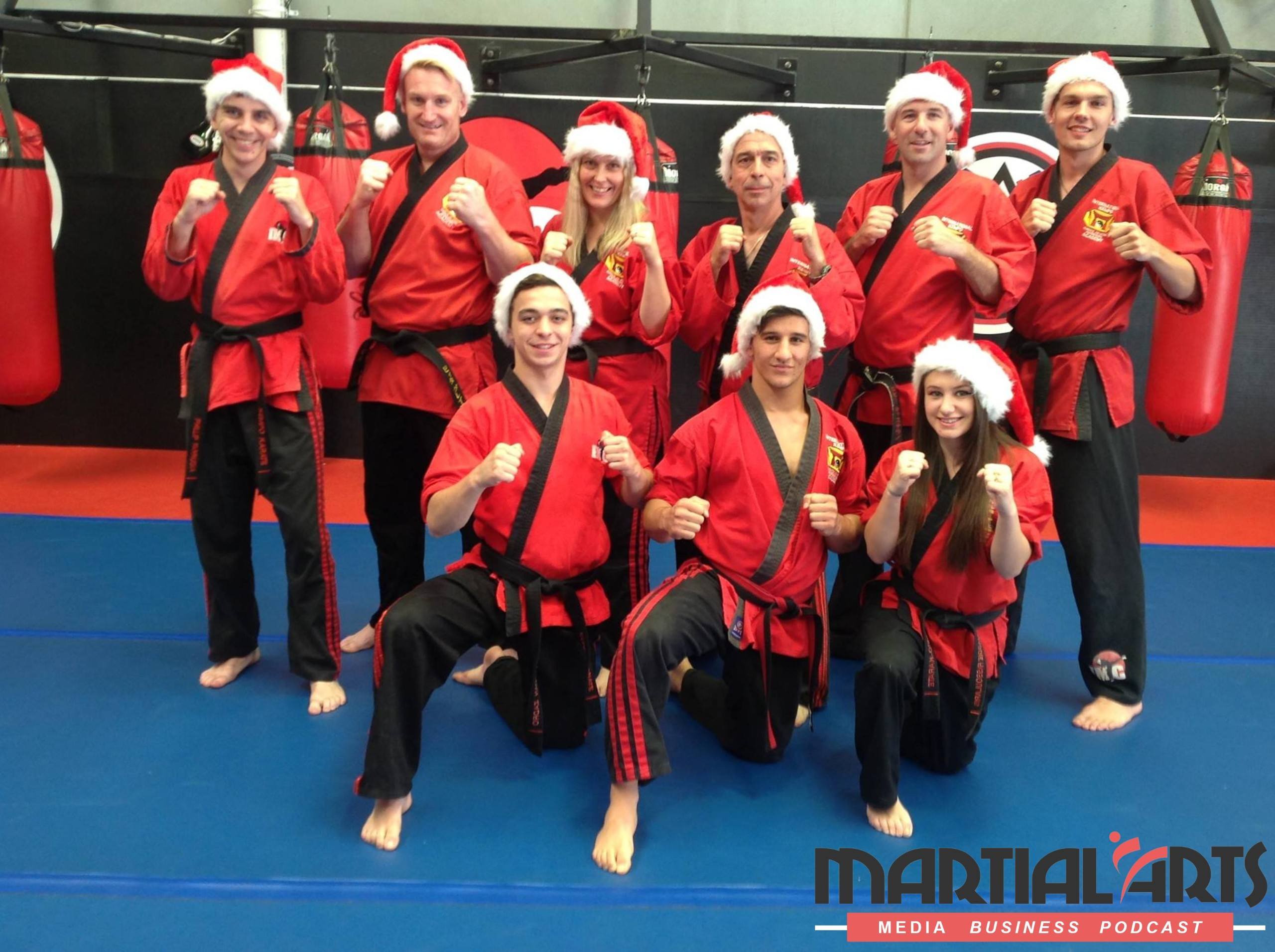
GEORGE: You mentioned your wife trains as well. So, is it just you in the business? Is it family business or?
ROBBIE: Yeah. It's just me and my wife. She mainly does all the admin for the school which I'm pretty lucky because that's what she studied in university. So, it all planned out and worked together. She stays at home, I pretty much run the school. I've got my manager of the school, so I don't have to always be there. I try to have at least a couple of days off in the week to spend with my family, but it's all about the system. You've got to design those systems, then you've got to stick to them and make sure they work. As soon as one of those systems kicks out, it all falls apart. So, I think it's so important that you have those right and stick to it.
GEORGE: I'd love to ask you about that. So, you're mentioning, obviously you're preparing to go for a second school, so yes, your systems have to be in place and you mentioned, okay, you've got your wife involved, but you mentioned she doesn't really come to the dojos, just working at home.
ROBBIE: Behind the scenes, yep. She's not behind the scenes.
GEORGE: You've got family, you've got kids, right?
ROBBIE: Yeah, I've got two little kids, five and two. My son who's five, he trains and he's one of those karate kids that pretty much lives at the school and he loves it. So, I'm very grateful for.
GEORGE: So, how do you manage this and moving forward? So, you mentioned you're really clear about your systems and then your family time. So, how do you create that balance and especially knowing that you've got the new location coming as well?
ROBBIE: Yeah. Well, it all comes down to the right person, right? If you can open up another school, you wouldn't do it unless you had someone that you believe in that could do it. So, that's where our leadership program comes into place. So, we have a person now that's ready to step up, she's pretty much been managing my school for the last couple of years. I sort of stood back a bit to see how she runs it all by herself and she's proven that she can do it easily. So, we sat her down and asked her if she wants to move forward and open up another school and run that one and she agreed. So, she's in the process now of training somebody to replace her which is awesome. All about the systems.
GEORGE: So, let's say you're starting the systems, what are the core systems that you have to have in place before you feel that you're ready to open that extra location?
ROBBIE: I think, well, my instructor always told me as a test, if you go on holidays for a month and your school grows by that person that you've left in charge, then they're capable of running the school on their own. If it fails and you lose students while you're away, then maybe that person isn't. So, that's one little test we do. We make sure everyone's trained up.
Okay. So, we've got our leadership program like I said and we have different levels in that leadership program and if someone isn't up to standard in a certain area, we make sure that they need more training. We do our staff training once every couple of months, a big staff training or we make sure everyone's up to speed because there's always new casuals and new leadership members. We just make sure our standard's high and up to date.
GEORGE: And sort of the core system? Like the system of systems that the … the one thing that kind of steers everything and puts everything in place, what would you say that is?
ROBBIE: Yeah. Look, it's pretty straight forward like every other school. You know what I mean? There's so much information out there now. You can go on Facebook and see a whole lot of stuff even for free. It's funny because, like I go to the ISKA tournaments and I speak to so many school owners that are trying to do martial arts full time and I tell them all the different stuff, they like to go to an EFC conference for example.
I tell them they should go if they want to grow. And then they don't do it. You know what I mean? It's simple stuff that you can follow and they just don't do it and then they wonder why they don't grow. You know what I mean? So, yeah, just all the basic normal stuff that's out there. Follow the system that everyone has created. There's plenty of information out there.
GEORGE: Okay, cool. So, Robbie, you're well established, you guys have got … you tick all the boxes, you've got the systems, you've done your ten thousand hours and beyond in business. So, if you had to break it down, what advice would you give to someone going from zero to a hundred, a hundred to two hundred, two hundred to three hundred students, etc?
ROBBIE: Yeah. Look, first of all, if I was … first thing I'd do is find the right location. All our schools and even our future schools, we open up on a main road. So, that's half of our marketing already done for us. You can try to beat the rent and get something a little bit cheaper in the back alleys, but you're going to pay more in marketing. So, all our schools must be on a main road. So, that's one thing I'd be looking at. The next thing is, is I'll be trying to find the first person that walks into my dojo with leadership skills and I'd be starting to train that person to help and eventually put them on staff. That would be my first things.
GEORGE: So, location, super important, and then really identifying that leader from the get go. Anything else from that point?
ROBBIE: From there, if I started to grow my school, the next thing I would a hundred percent put in would be a leadership program, whether it's kids or teenagers, because that's going to be your core of your school of who can run your school for you while you can concentrate on other things to grow. So, I'll be a hundred per cent be all for leadership programs straight away.
GEORGE: That's gold right there. Good location, half your marketing's done, find your right leader and start focusing on the team building.
ROBBIE: Straight away. Yep.
GEORGE: Anything else you would add to that?
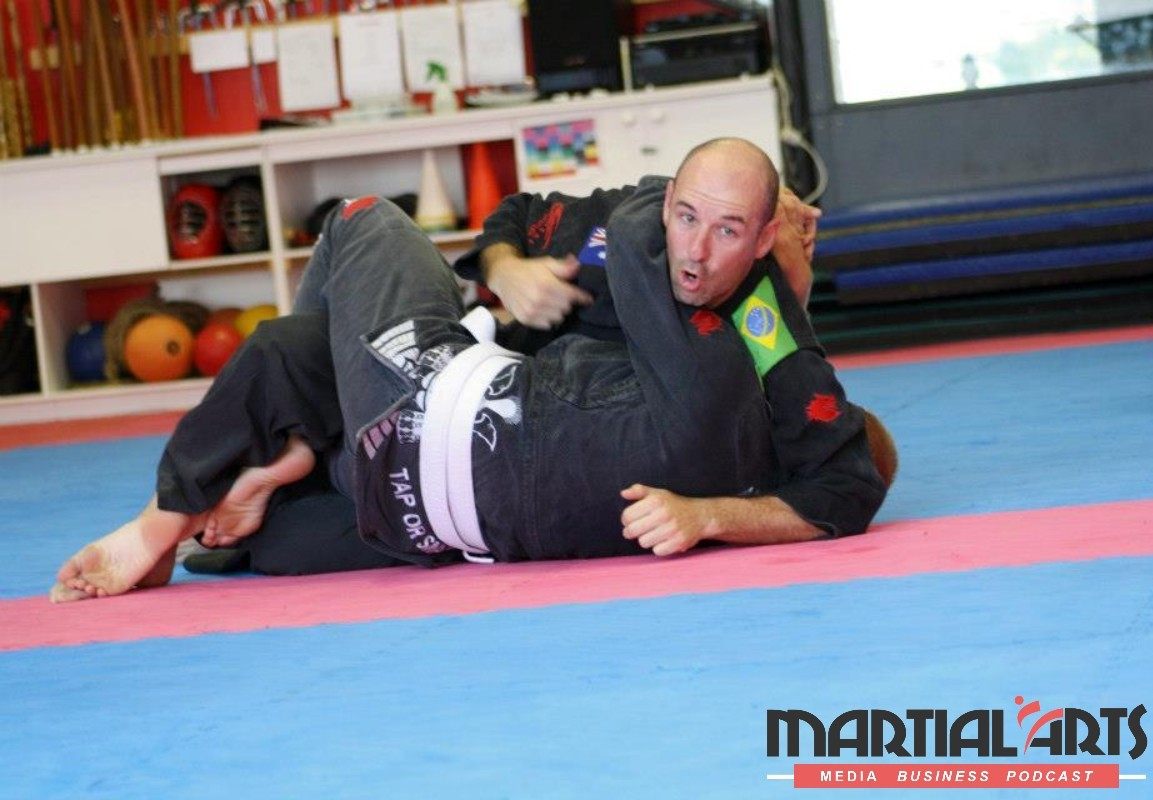
ROBBIE: From there, the school would grow because you would've trained your staff to how you want it, to follow the systems, I'll probably sign up with, if I didn't have an organization like I do, I'd probably sign up with … I mean, there's plenty of companies out there that help you, I'd kind of like to stick with the Aussie groups. I'd be signing up for that straight away as well because that's going to help you grow your school. These guys have got it all in place for you.
That's what I keep saying to these guys that I was talking about. It's already done for them. They've just got to sign up and follow it. They don't do that. That's why they don't grow. So, if you're serious about going to school, find a good mentor that's done it before and follow the system. It's not rocket science.
GEORGE: Do the work, right? Okay, awesome. So, one or two more questions. You mentioned your location in Liverpool, right? So, you're on a main road. It's also probably, on a wild guess, reckon that Liverpool has the most martial arts schools per square meter in the whole of Australia. So, what's your take on that, on the competition?
ROBBIE: It's true, there's so many martial arts schools right where I am in … I remember telling my instructor about it when he offered me the job. I said, oh, but there's so many schools around here, how are we going to compete? He pretty much said if you do the things that I tell you to do, you'll be the biggest and you won't worry about them. That's what we did and now we are the biggest. I've got a school that's 200 meters down the road from me and he's still successful. He's got I think about 400 students and I've got 500 students. It doesn't matter.
Would I be bigger? Probably. I probably wouldn't be able to fit everyone in if he wasn't there, but it doesn't affect this really any way. As long as you keep your school professional and provide a good service, people always come. Know what I mean? So, it hasn't bothered us, no.
GEORGE: Thanks for being … I'm going to ask one question and I've been contemplating whether I should ask this question, but I think it's worth talking about it, because it's a … I've got my take on this word and question and a lot of people do. I'm going to keep my appointment back, my appointment, my opinion for now and I'm going to ask this question on a few podcasts and see how it goes. So, here it is. McDojo. The word McDojo. What does that mean to you?

ROBBIE: What is a McDojo? What even is a McDojo? I've heard the concept before. People say if you're big and you're charging quite high fees that you're a McDojo, I reckon it's all crap to be honest. Okay? Because, I mean our standard hasn't dropped and I challenge anyone who hasn't got a big score or has a smaller score and think that their standard is higher, then bring that student in, and see if they can keep some of our students. I'll bet you they can't.
So, just because we're large and we charge a higher fee, doesn't mean our standards drop. If anything, I think our standards rise because if we don't provide a good service and keep a higher standard, then they'll leave and they can go down to the road to the $10 a week school, that's fine. So, I think it's a load of crap to be honest.
GEORGE: Love it. Awesome. Robbie, it's been great having you on. Where can people go to connect with you or find more about you?
ROBBIE: Yeah, you can see our website, www.prestonskarate.com.au or you can add me on Facebook at Robbie Castellano. You should find me on friends of all the high profile martial arts in the country. So, yeah, add me, I'll be happy to help you if you have any questions.
GEORGE: Fantastic. Thanks a lot Robbie.
ROBBIE: Thanks George, really appreciate it mate. You're a legend and it's awesome what you're doing, I love it.
Awesome. Thanks for listening. If you want to connect with other top, smart martial arts school owners, and have a chat about marketing, lead generation, what's working now, or just have a gentle rant about things that are happening in the industry, then I want to invite you to join our Facebook group.
It's a private Facebook group and in there I share a lot of extra videos and downloads and worksheets. Things that are working for us when we help school owners grow and share a couple of video interviews and a bunch of cool extra resources.
So it's called the Martial Arts Media Community and an easy way to access it is if you just go to the domain name martialartsmedia.group. So martialartsmedia.group. G-r-o-u-p. There's not dot or anything. Martialartsmedia.group. Then we'll take you straight there. Request to join and I will accept your invitation.
Thanks. I'll speak to you on the next episode. Cheers.
Here are 4 ways we can help scale your school right now.
1. *NEW** – Premium Martial Arts Websites with Easy Pay Plans.
If your website is not delivering new leads consistently, doesn't represent your true value or you simply need to make a change. Click here for details and a demo.
2. Join the Martial Arts Media community.
It's our new Facebook community where martial arts school owners get to ask questions about online marketing and get access to training videos that we don't share elsewhere – Click Here.
3. Join the Martial Arts Media Academy and become a Case Study.
I'm working closely with a group of martial arts school owners this month. If you'd like work with me to help you grow your martial arts school, message me with the word ‘Case Study'.
4. Work with me and my team privately.
If you would like to work with me and my team to scale your school to the next level, then message me with the word ‘private'… tell me a little about your business and what you would like to work on together and I'll get you all the details.
Enjoyed the show? Get more martial arts business tips when you subscribe on iTunes for iPhone or Stitcher Radio for Android devices.
***NEW*** Now available on Spotify!


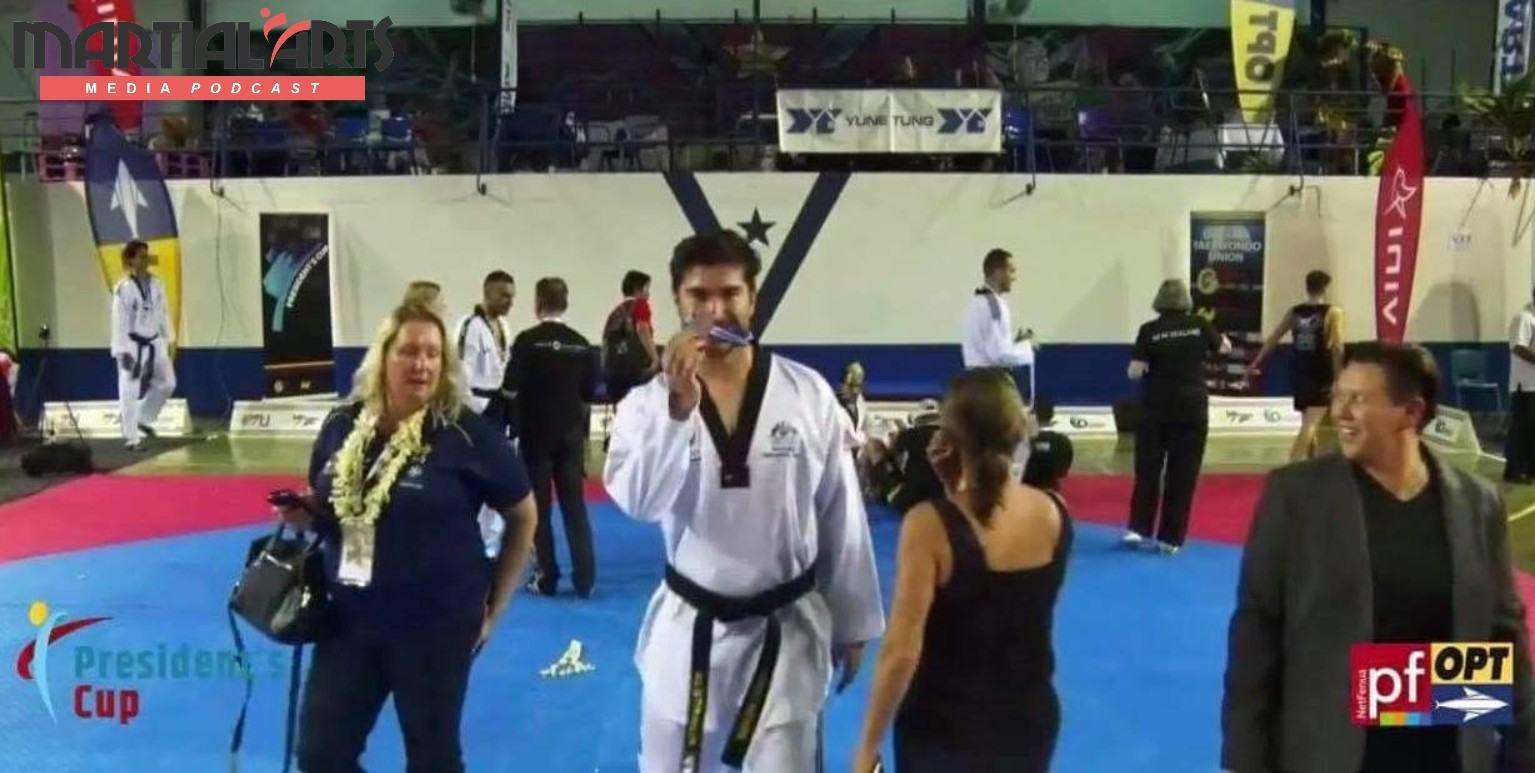
 So that was initially my plan, was to just get the three black belts. I thought, if I got three black belts like him, I'm going to be the champ of the world, that's how it works, right? I was 16, it's as simple as that to become a champion. So what I did was, it was just a complete fluke. I was already doing kickboxing a little bit, training 2-3 times a week, just fitness and enjoying myself and kind of watching rocky movies and stuff like that, which wasn't really serious. It was just kind of training for training’s sake.
So that was initially my plan, was to just get the three black belts. I thought, if I got three black belts like him, I'm going to be the champ of the world, that's how it works, right? I was 16, it's as simple as that to become a champion. So what I did was, it was just a complete fluke. I was already doing kickboxing a little bit, training 2-3 times a week, just fitness and enjoying myself and kind of watching rocky movies and stuff like that, which wasn't really serious. It was just kind of training for training’s sake. 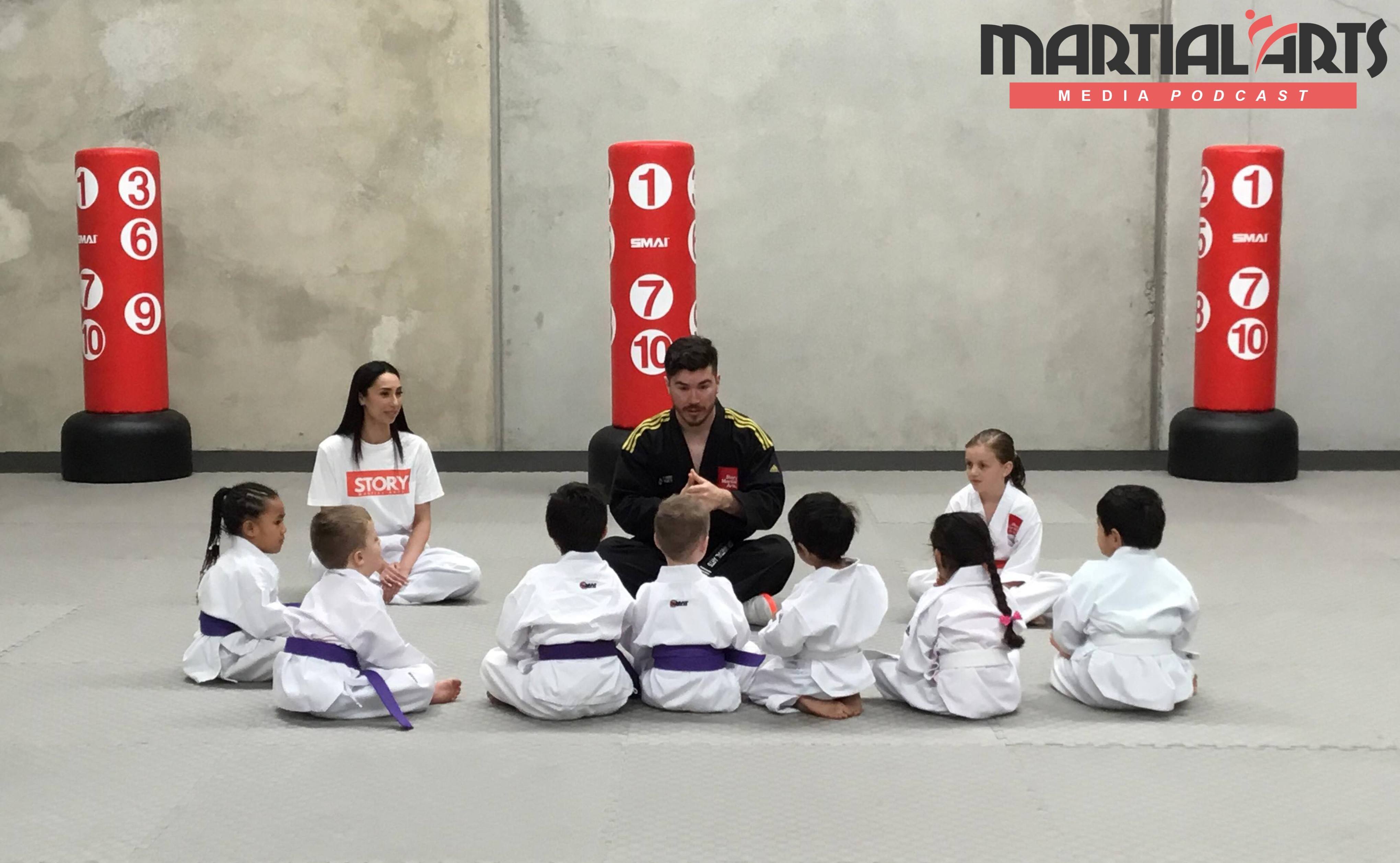
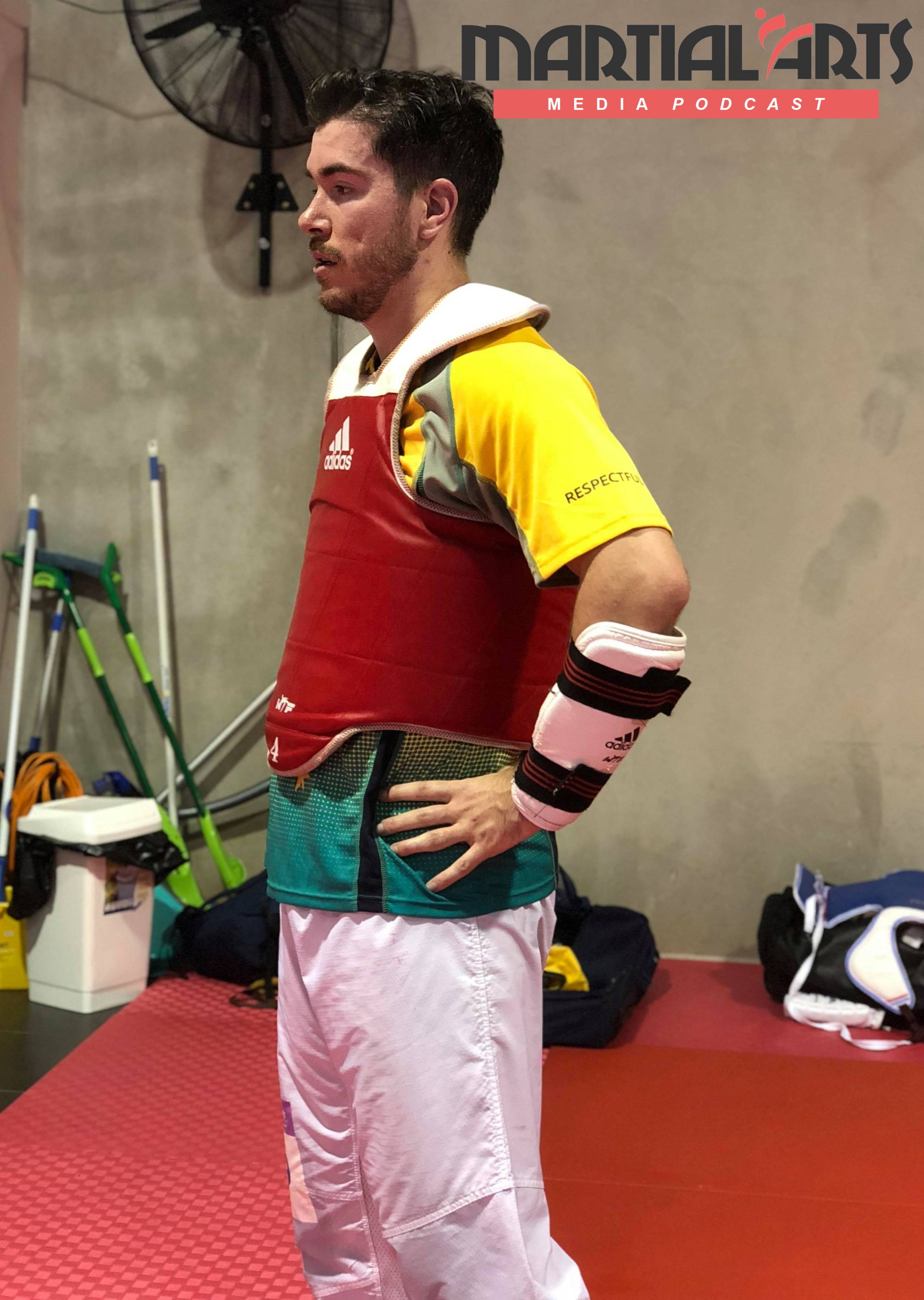 Because in my experience, I knew with my knowledge that I will be able to get the paid trials, that it would create the income that would cover that ad spent. I think a lot of martial arts business owners don't charge enough for their services, that's for sure. Someone told me once they were charging like $50 a term, or unlimited classes, but I could have 500 students. Well, on that price, I probably only need like 90.
Because in my experience, I knew with my knowledge that I will be able to get the paid trials, that it would create the income that would cover that ad spent. I think a lot of martial arts business owners don't charge enough for their services, that's for sure. Someone told me once they were charging like $50 a term, or unlimited classes, but I could have 500 students. Well, on that price, I probably only need like 90.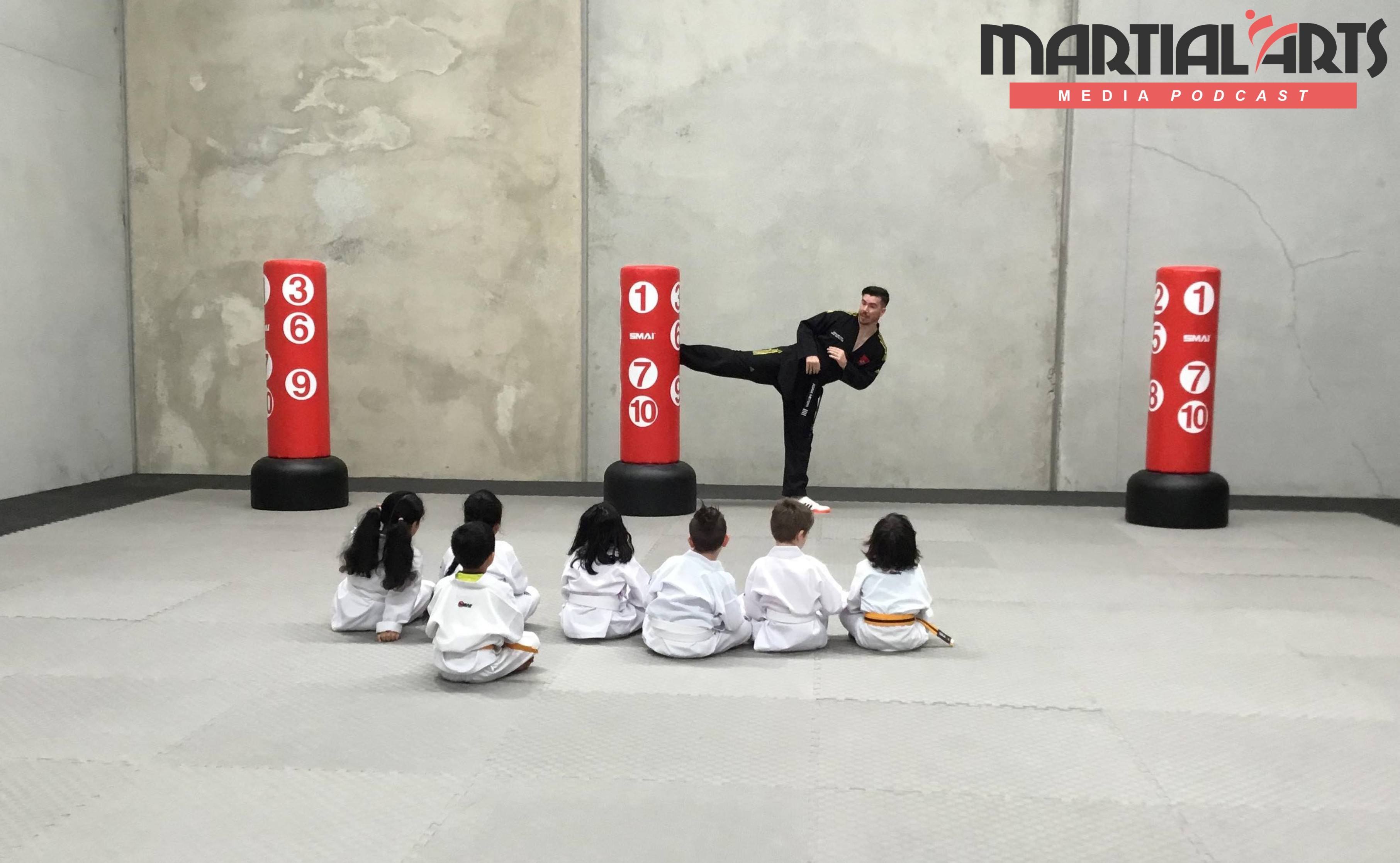
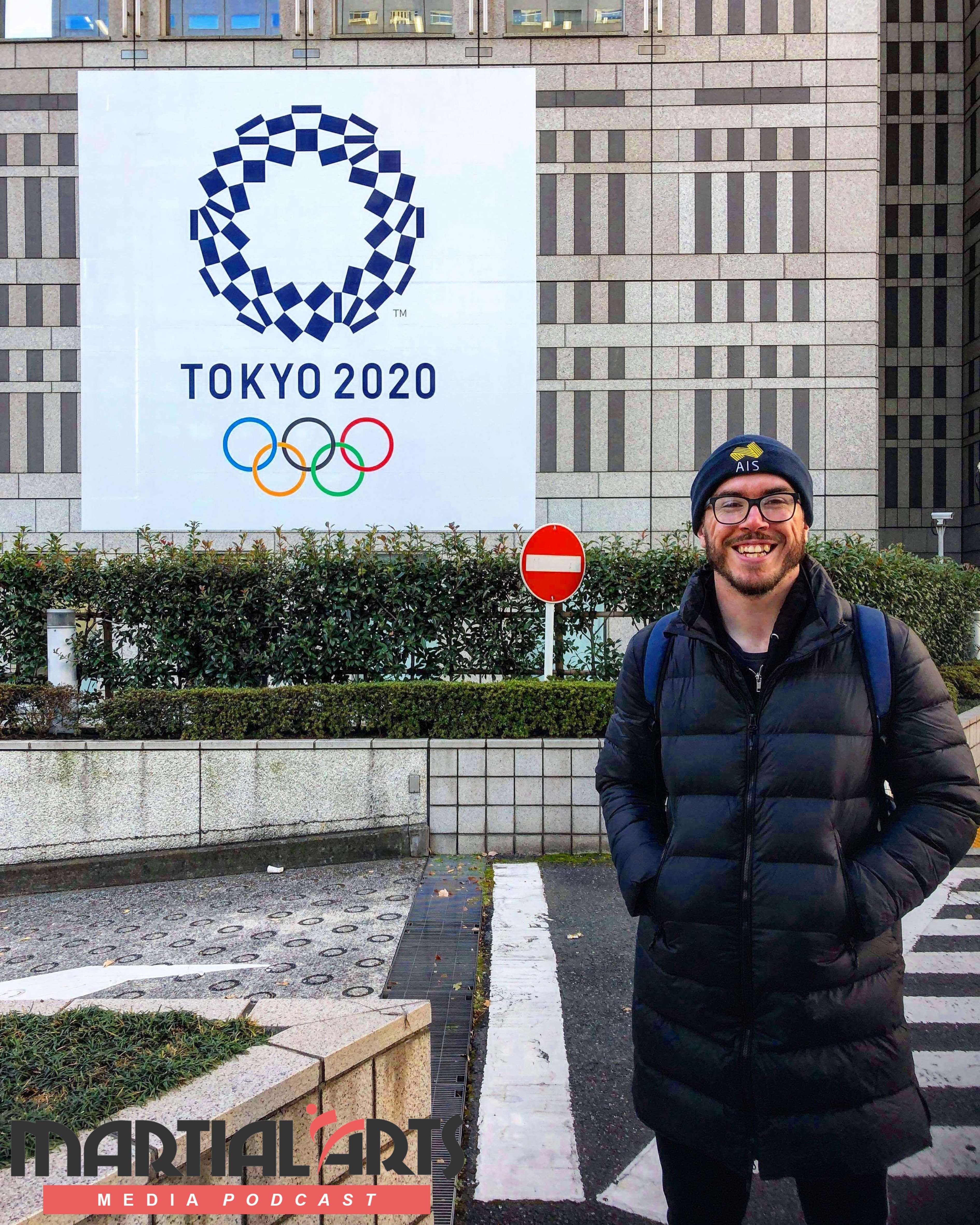 So I think that's what we’re really trying to curb, is making sure that the parents know that I’m teaching good classes. I'm obviously teaching good classes, we have this many students, we’re taping a lot of them. My recent boost for this, we had 97% sign up from trials, no word of a lie. So anyone who's listening I can send a screenshot. So all those kids that are staying in, obviously we’re running a good program. But the challenge now becoming a bigger school is, can you run a good program at 500?
So I think that's what we’re really trying to curb, is making sure that the parents know that I’m teaching good classes. I'm obviously teaching good classes, we have this many students, we’re taping a lot of them. My recent boost for this, we had 97% sign up from trials, no word of a lie. So anyone who's listening I can send a screenshot. So all those kids that are staying in, obviously we’re running a good program. But the challenge now becoming a bigger school is, can you run a good program at 500?

